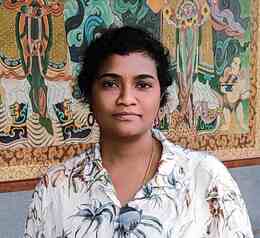4th Edition World Congress on
Gynecology, Obstetrics & Women's Health
THEME: "Empowering Women's Health: Innovations in Gynecology and Obstetrics"
 27-28 Oct 2025
27-28 Oct 2025  Bali, Indonesia
Bali, Indonesia THEME: "Empowering Women's Health: Innovations in Gynecology and Obstetrics"
 27-28 Oct 2025
27-28 Oct 2025  Bali, Indonesia
Bali, Indonesia 
Aparna hospital, India
Title: Effect of supplementing standard infertility treatment with Indian traditional Poongar rice on pregnancy outcomes: interim analysis of a prospective study in Perambalur district, Tamil Nadu, India
Aparna
Rajendran completed her M.B.B.S. (2009) and M.S. in Obstetrics and Gynecology
(2014) from Stanley Medical College, Tamil Nadu, India. She later pursued a
Diploma in Acupuncture (2016, Tamil Nadu) and further enhanced her surgical
expertise by earning FMAS and DMAS credentials in 2022 from Gurugram, India.
Additionally, she holds a Fellowship in Reproductive Medicine (FCRM) and a
Diploma in Cosmetic Gynecology (DCG), 2025, India.
Her
area of special interest lies in Spiritual Gynecology, where she explores the
integration of yoga, meditation, natural lifestyle, and modern medical science.
Her work focuses on promoting holistic well-being and bridging traditional
healing philosophies with contemporary gynecological practice.
Introduction: Infertility affects 15–20% of
couples worldwide and up to 16.8% in India, with profound social and
psychological impact. Poongar rice, a traditional Tamil Nadu variety rich in
antioxidants, phenolic acids, iron, and zinc, may reduce oxidative stress, regulate
blood sugar, and support ovulation. This study evaluates whether supplementing
standard infertility treatments with Poongar rice improves pregnancy outcomes
in women aged 20–40 years.
Methods: A single-arm prospective study was
conducted at a private infertility center in Perambalur, Tamil Nadu, recruiting
70 infertile women aged 20–40 years over 18 months. All received standard
infertility treatments with ovulation-inducing drugs, alongside daily dietary
supplementation of standardized Poongar rice, monitored through food diaries
with nutritional counseling. Pregnancy was confirmed by urine card test and
ultrasound. The data was entered in MS excel and analysed using Python
Results: Seventy women participated, with a
mean age of 27 (4.1) years and a BMI of 20.4 (4.1). Most had experienced more
than 3 years of infertility, with prior treatments averaging 2.5 (1.7) years.
Around 68.4% had polycystic ovarian disease and 86.7% had thyroid disorders.
Regular menstrual cycles were noted in 68.2% of participants. Around 87% of
participants consumed the poongar rice daily, and 5.2% consumed it 4-5 times
per week and 93.3% found it easy to integrate into their diet with no serious
adverse effects were observed. By the end of the study, 40 women (57.1%) had
successfully conceived and the mean (SD) time for conception was 6.2 (1.2)
months
Conclusion: Poongar rice supplementation
improves pregnancy outcomes by reducing oxidative stress and supporting
ovulation through its antioxidant and nutrient-rich profile. As a culturally
appropriate and affordable intervention, it shows promise for infertility management
in resource-limited settings, meriting further research.